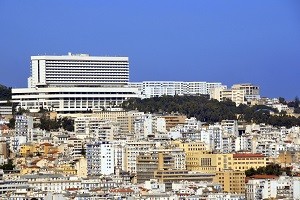Algeria
Algeria has significantly developed its healthcare sector in the last several decades. However, it is still not up to par with global health standards, especially those in developed countries – more resources are needed to make this a reality. Free medical services have been available in Algeria since the early 1970s. These services are extended to children, the aging population, and poor or low-income persons and cover all costs related to pharmaceutical drugs, hospitalization, and long-term care. Since the mid-1980s, the government has focused on prevention as opposed to cures and treatment in order to meet the needs of the country’s youthful population. Clinics, immunization campaigns, and health promotion centers were also a focus; however, currently, the country needs to build more infrastructure to ensure that basic healthcare needs are met.
Healthcare Spending
Spending on healthcare-related costs is low in Algeria. In 2012, 5.3% of the GDP went to healthcare. In comparison to the rest of the world, Algeria ranks 166th out of 190 countries on the percentage of national GDP spent on healthcare. In 2012, this percentage amounted to a total of $439 USD per capita, a figure that is more than triple the average spending for the rest of the World Health Organization (WHO) African Region. Unfortunately, the African Region has one of the lowest averages for healthcare spending in the world. High-income countries may spend upwards of 10% of the GDP on healthcare costs, which usually amounts to thousands of dollars per person.
 Availability of Care
Availability of Care
The healthcare workforce in Algeria has grown in recent years; however, there is still a shortage of trained doctors, nurses, and midwives. Currently, there are 1.21 physicians for one thousand people in the country, or a ratio of 1:826 physicians to people. Once again, although this figure is above the regional average, it is low compared to the rest of the world. Similarly, there are a mere 1.95 nurses and midwives per one thousand persons in Algeria, compared to 1.2 nurses and midwives per one thousand people in the African region.
Life Expectancy & Mortality
Current figures for life expectancy in Algeria are moderately high compared to neighboring African countries. The average longevity is 76.39 years, ranking Algeria 80th in the world on this measure. For women in Algeria, the average life expectancy is even higher, at 77.12 years. Men’s average life expectancy in Algeria is lower, at 75.12 years.
 Other Issues
Other Issues
When Algeria gained independence, the country’s healthcare system was barely existent. Figures suggest that there was approximately one physician per over 30,000 people. Today, there is a significantly higher concentration of physicians and more graduating from Algerian medical training institutes every day. The focus of the Algerian healthcare system is also shifting. Incidences of communicable diseases such as tuberculosis, cholera, and malaria are decreasing, while non-communicable diseases, including heart disease, diabetes, cancer, and stroke, are now responsible for 77% of all deaths in the country. While medical efforts must now shift to help lessen the mortality rates of these diseases, this indicates that the improvements made to the healthcare system in recent years have had an impact.
